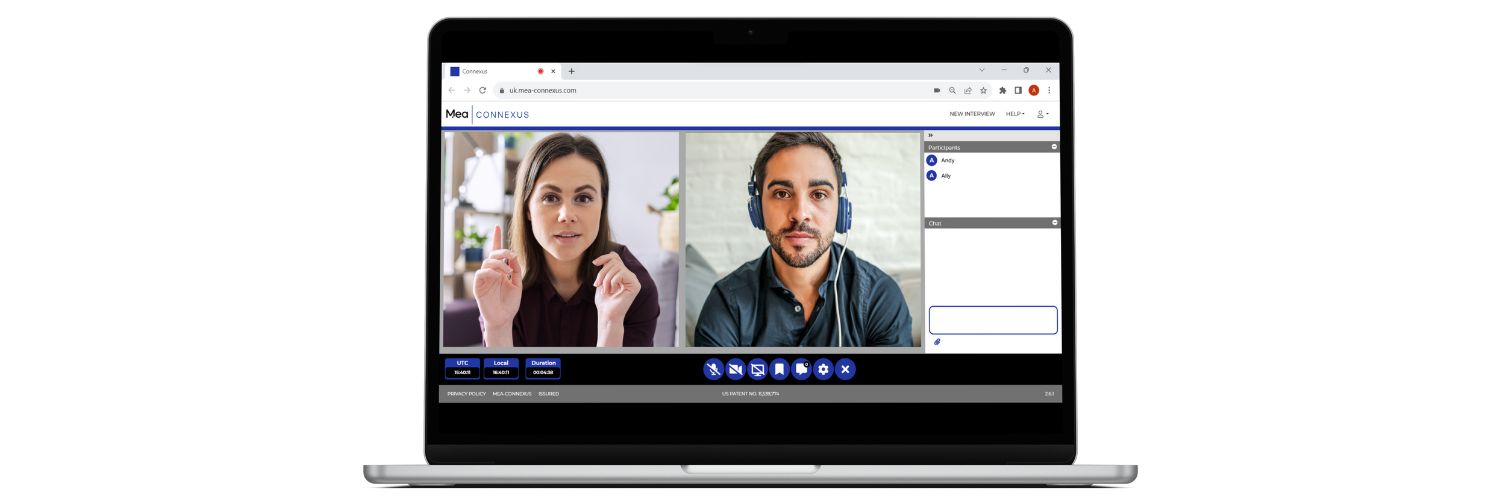Technological innovations in many private industries are ever-evolving, often experimenting with new methods to complete tasks more efficiently. Public sector services can often find it more challenging to digitally transform their processes due to budgetary allocation and funding cycles as well as occasional governmental bureaucracy that hinders the ability for public sector services to be truly agile.
Unfortunately this can leave law enforcement agencies’ officers, agents and staff using IT systems which quickly becomes obsolete or susceptible to cyber threats.
The COVID-19 pandemic brought to the fore (due to working from home) remote video interviewing to carry-out what were previously face to face meetings, consultations and interviews. In particular, police investigations have been seen to benefit through the use of remote video interviewing. In this article, we uncover seven of the benefits to law enforcement staff and the end-users of video interviews, the current state of video interviewing in law enforcement and one solution that was purpose built for virtual law enforcement investigations.
7 Benefits of Video Interviewing in Law Enforcement
Using a remote video platform for investigations can offer several benefits to US law enforcement agencies. Here are seven advantages in comparison to traditional in-person interviews:
- Cost Savings: Remote video interviews can significantly reduce travel expenses, such as transportation, accommodation, and daily costs. This allows LEAs to allocate their budgets more other priority areas.
- Time Effectiveness: Virtual interviews save time by eliminating the need for officers to travel to different locations. Investigators can quickly communicate with witnesses, translators experts, or other participants, facilitating faster information exchange.
- Rapid Accessibility: Remote interviews make it easier to interview witnesses, victims, or voluntary suspects who might be located in geographically distant or hard-to-reach areas, providing access to even more, and potentially vital, information. When recalling past incidents from memory, witnesses are better able to recall events shortly after than days later.
- Record Keeping: Video interviews can be easily recorded, which helps in maintaining an accurate and detailed record. Information can be retrieved easily and collaborated on remotely within virtual major investigation rooms. These recordings are invaluable as evidence in legal trials.
- Flexibility and Scheduling: Remote interviews provide more flexibility in scheduling, allowing for calls to take place outside of regular working hours or on short notice. This makes it more convenient for victims, witnesses and law enforcement personnel.
- Reduced Risk: In certain situations, conducting interviews remotely can reduce the risk to both law enforcement officers and the individuals being interviewed, especially when personal safety is a concern.
- Environmental Benefits: By reducing the need for travel, remote video calls contribute to a lower carbon footprint, which meets broader environmental sustainability goals.
The State of Video Interviewing in Law Enforcement Currently
Since the COVID-19 pandemic, the state of video interviewing in law enforcement has been constantly evolving, with many agencies starting to adopt this technology. As it became necessary to reduce physical contact and maintain social distancing, agencies turned to video interviews to continue their work while minimising health risks.
This required integration with existing systems, for case management or record-keeping, which can be a simple procedure if the LEA has the resources to transition to new technology. For smaller Police Departments (PD), time and resource constraints meant that adoption of remote video interviewing was difficult.
As the world grappled with virtual life, a growing concern was the security of online video interviews, especially in LEAs that rely on protecting the chain of custody and ensuring the interview can’t be jeopardised. When combining cyber threats with the growing prevalence of deepfakes and digital disinformation, this has caused serious concern for legal cases that rely on digital evidence. Generative Artificial Intelligence (AI) has become inexpensive and more accessible to the masses. Deepfakes and digital disinformation are routinely circulated online and it will not be long before the public start to question every piece of digital media or evidence that is presented to them. Once the defence council start to challenge the authenticity of every piece of digital evidence, cases for prosecution are at risk of failing and the cost of proving authenticity is likely to widely impact law enforcement.
Now some years since the introduction of mainstream remote video communication, is there a solution which law enforcement agencies can use that addresses security, integrity and scalability?
MeaConnexus – Digital Integrity and Authenticity for Interviews
Developed as a direct consequence of realising the coming threat and risk of deepfakes and digital disinformation, UK company, Issured, developed MeaConnexus. Built using blockchain technology, the video interview content is tamper evident, meaning that if a person were to alter just one pixel, from one frame of the video, all interested parties would be able to tell.
Unlike other popular virtual video platforms, MeaConnexus wasn’t built for multiple use cases, it was built for investigations. From witness, victim and voluntary suspect interviews to formal hearings, MeaConnexus provides evidential integrity so you will always have access to the original recording.
And so while deepfakes are becoming a serious concern, MeaConnexus prevents deepfakes from the very start, by providing users and third parties with the ability to prove the digital integrity and authenticity of their video interviews.
This provides the ultimate benefit of reducing risk of legal challenge, and therefore the cost of proving evidence authenticity and potentially the reputational damage of losing a case.

Designed for law enforcement, key features that uniquely support investigation in MeaConnexus include:
- Silent Observer – A two-way mirror to the interview for individuals or teams to privately observe and provide intelligence and information to the interviewer.
- Auto Transcription – Providing an immediately available transcription of the entire interview presented in a time coded and named format.
- Digital Evidence Integrity – Prove the authenticity and integrity of the digital interview content within seconds and avoid the legal challenge.
- Bookmarking and Annotation – Allows investigators or teams of investigators to collaborate and make notes on interview content either during, or after, the interview.
- No Hardware, No Software – Setup MeaConnexus within an hour with no need to purchase costly hardware or install new software.
- NIST and CJIS Compliant – Rest assured that your data is protected and managed in accordance with International and Federal standards.
Get in touch today if you have any questions regarding MeaConnexus, or discover more features and benefits of MeaConnexus here.





